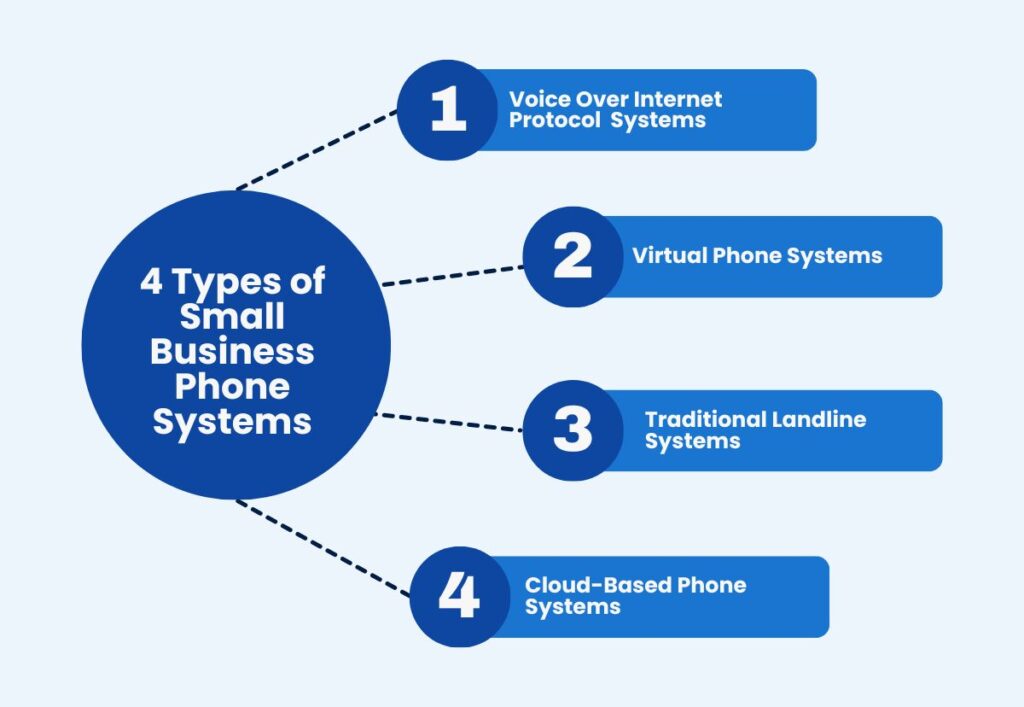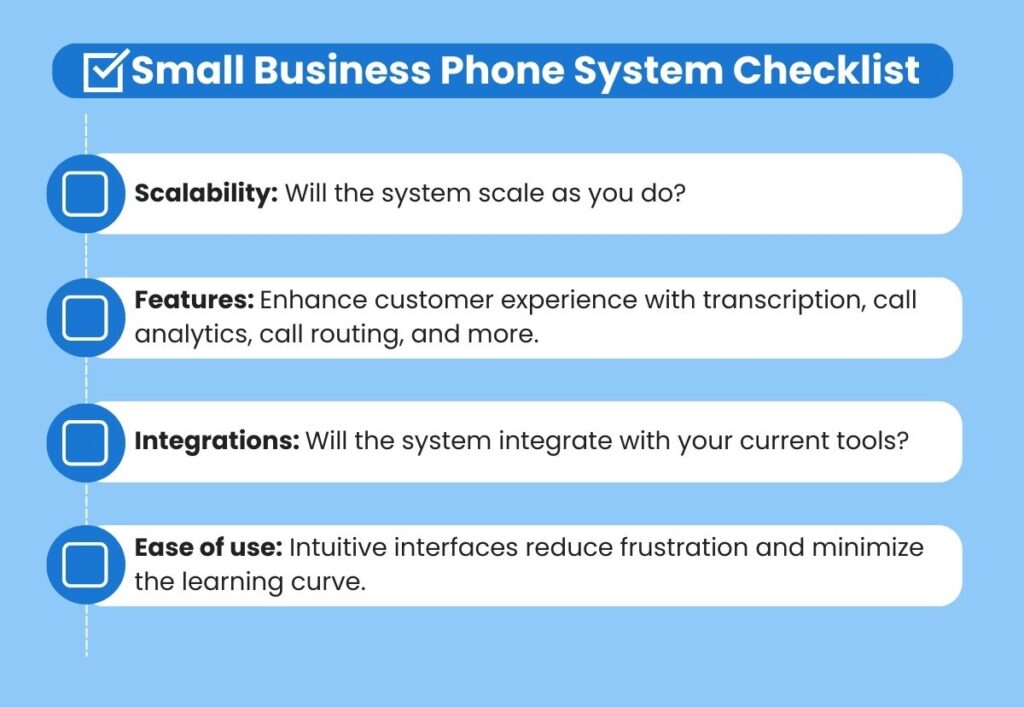Riiing, riiing. Your customers are calling — don’t leave them hanging.
According to our research, 35% of businesses still believe that phone calls are the most effective communication channel. Therefore, choosing the right phone system is critical for any small business. It’s not just about making calls; it’s about ensuring seamless communication, enhancing customer service, and supporting your business’s growth.
In this blog, we’ll cover what to look for in a small business phone system, which phone systems are the best for small businesses, and more.
Table of contents
- What is a small business phone system?
- How much does a small business phone system cost?
- 3 advantages of small business phone systems
- Types of small business phone systems to consider
- The top 11 small business phone providers
- How to choose the right phone system for your needs
- Top features to look for in small business telephone solutions
- Phone small business FAQs
- Streamline customer communication with Birdeye
What is a small business phone system?
A small business phone system is a communication setup specifically designed to meet the needs of small businesses. It typically includes features like multiple phone lines, voicemail, call forwarding, and sometimes advanced options like auto-attendant and conference calling. This system allows small businesses to efficiently manage incoming and outgoing calls, offering a more professional customer interaction experience.
Birdeye – all-in-one platform
Improve customer communication with Birdeye.
How much does a small business phone system cost?
The cost of a small business phone system varies widely depending on the type of system, the features required, and the number of users. For VoIP systems, prices typically range from $20 to $50 per user per month, while traditional landline systems may have higher initial setup costs and monthly fees. Cloud-based and virtual systems generally offer more cost-effective and scalable options, with many providing customizable plans to fit specific business needs and budgets.

3 advantages of small business phone systems
The right small business phone system can elevate your brand’s image and significantly improve operational efficiency and the customer experience. Let’s take a deeper look at some of the advantages they bring.
1. Professionalism and brand image
First impressions matter immensely in business. A dedicated small business phone system goes a long way in establishing your brand’s professionalism. With features like personalized greetings, on-hold music, and professional voicemail messages, your business projects a robust and competent image. This level of professionalism instills confidence in your clients and potential customers, assuring them they are dealing with a serious and established entity.
2. Efficiency and productivity
In the fast-paced business world, efficiency is critical. Small business phone systems have features like call forwarding, automatic call distribution, and conferencing capabilities. These functionalities streamline your operations, allowing for quick and effective communication both within the company and with clients. For sales and customer service teams, this means connecting with the right person at the right time, reducing wait times, and improving the workflow. Enhanced communication increases productivity, as team members can collaborate easily and promptly address customer needs.
3. Enhanced customer experience
At the heart of any successful business is excellent customer service. Advanced features of small business phone systems, like interactive voice response (IVR), auto-attendants, and easy call transferring, contribute to a seamless and responsive customer service experience. These systems ensure that customer calls are never missed and always directed to the appropriate department or individual. Moreover, features like call queues and voicemail-to-email ensure that customer inquiries are managed efficiently, even during high call volumes. These systems help build customer loyalty and satisfaction by providing reliable and professional customer interaction.
Types of small business phone systems to consider
To choose the office small business phone system for your small business, you need to understand the pros and cons of different types of systems. The four main types of office phone systems for small businesses include:
- Voice over internet protocol phone systems
- Virtual phone systems
- Traditional landline systems
- Cloud-based phone systems

Each phone system offers distinct advantages and challenges and could be suitable for different types of businesses based on size, operational needs, and resources. We’ll explore the differences between them below.
1. Voice over Internet Protocol phone systems
Voice over Internet Protocol (VoIP) systems use the internet to make and receive calls, converting voice into digital signals. This technology allows you to make calls from computers, VoIP phones, or traditional phones with adapters.
Pros of VoIP business phone systems
- Cost-effective, often cheaper than traditional phone lines
- Feature-rich, including voicemail to email, call forwarding, and conferencing
- Scalable and flexible, easy to add or remove lines/users
Cons of VoIP business phone systems
- Dependent on internet quality — poor internet leads to poor call quality
- Power outages can disrupt service unless backed up by an alternative power source
VoIP systems are ideal for businesses with reliable internet that need a cost-effective, feature-rich phone system especially suited for remote or distributed teams.
2. Virtual phone systems
Virtual phone systems forward calls originally made to a business phone number to personal mobile devices or home phones instead. These phone systems are hosted in the cloud and offer features like voicemail, automated receptionists, and call screening.
Pros of virtual phone systems
- Highly flexible and allows employees to work from anywhere
- Low setup costs — no need for physical hardware
- Professional features like auto-attendant and custom greetings
Cons of virtual phone systems
- Calls are still routed through personal phones, which may incur costs
- Limited on-premises hardware can be a drawback for some businesses
Virtual phone systems are ideal for small businesses or startups with remote workers or those looking for a professional phone system without significant investment in hardware.
3. Traditional landline systems
Traditional landline desk phones are analog systems that run via the telephone company’s copper wiring. They are often supported by private branch exchange (PBX) hardware that enables features like multiple extensions and call directories.
Pros of traditional landline systems
- Reliable and time-tested
- Not dependent on the internet
- Familiar to most users
Cons of traditional landline systems
- Can be more expensive due to installation and maintenance costs
- Lack of advanced features compared to VoIP or virtual systems
Traditional landline systems are ideal for businesses that need a reliable, traditional phone system (especially those in areas with unreliable internet) and have no desire for advanced features.
4. Cloud-based phone systems
These are a type of VoIP system, but entirely hosted and maintained off-site in the cloud. The service provider manages features and updates.
Pros of cloud-based phone systems
- No need for on-site PBX hardware or maintenance
- Scalable and includes advanced features like call analytics
- Regular updates and new features from providers
Cons of cloud-based phone systems
- Dependence on the service provider for maintenance and updates
- Requires a stable internet connection
Cloud-based phone systems are perfect for businesses looking for a modern, scalable phone system without the hassle of maintaining hardware.
The top 11 small business phone providers
There are a lot of small business phone providers on the market — each has pros and cons. Here’s a list of the most popular options to consider.
1. Nextiva
Nextiva is an all-in-one communication solution for businesses. It’s known for its reliability and rich features, including advanced call management, CRM integrations, and analytics tools. It is ideal for businesses looking for a comprehensive communication platform.
2. RingCentral
This system is a versatile choice for businesses requiring a robust range of features and integrations. RingCentral offers everything from video conferencing to team messaging and is particularly favored for its flexibility and scalability.
3. Ooma
Ooma is affordable and user-friendly, making it an excellent option for smaller operations or startups. It offers essential features like voicemail, call blocking, and an easy-to-use interface, all without breaking the bank.
4. Zoom
Zoom is widely recognized for its video meeting capabilities, but it also offers a comprehensive phone system. This platform is adaptable to various business needs and integrates seamlessly with its video and messaging services.
5. Vonage
Vonage is a scalable solution for businesses poised for growth. It provides diverse features and integrations, including cloud-hosted VoIP services, making it a versatile choice for expanding companies.
6. Dialpad
Dialpad stands out for utilizing AI to enhance communication and provide insightful data analytics. It’s designed for businesses looking to leverage technology for more innovative, data-driven communication strategies.
7. GoTo Connect
This platform combines phone, messaging, and meetings into a unified communications system. It’s ideal for businesses seeking a streamlined approach to handle all their communication needs in one integrated platform.
8. Grasshopper
Grasshopper is simple yet effective, catering to solo entrepreneurs and small teams. It offers basic phone system features with an easy setup, perfect for those starting out or with minimal technical expertise.
9. Net2Phone
Net2Phone is particularly well-suited for global businesses. They offer extensive features, including international calling options, making them ideal for companies with a worldwide presence or those looking to expand globally.
10. Google Voice
Google Voice is a straightforward, budget-friendly option for startups and small businesses. It integrates well with other Google services and offers basic phone system functionalities like voicemail transcription and call forwarding.
11. FreeConferenceCall
This service focuses on conferencing capabilities, perfect for businesses that rely heavily on group calls. It provides reliable conferencing services and features like call recording and screen sharing.
How to choose the right phone system for your needs
Now that you understand the various modern phone systems available, it’s time to consider your unique needs. There are plenty of good options on the market, but what does your business actually need out of a phone system?
We recommend carefully evaluating the following elements before committing to a platform.

Scalability
As your business grows, will your communications keep pace? Ensure the phone system easily scales up (or down) to accommodate fluctuating needs. Adding lines, features, and locations should be simple without requiring new infrastructure.
Advanced features
Beyond the basics like call routing, voicemail, etc., advanced features seriously enhance customer and employee experiences. Prioritize options with voicemail-to-text transcription, real-time call analytics, conference calling, and integrations.
Compatible integrations
Speaking of integrations, your phone system should complement existing software platforms for streamlined data sharing. Look for native, seamless CRM, help desk, marketing automation, and other popular tool integrations.
Ease of use
Intuitive, simple interfaces reduce frustration and minimize the learning curve for staff. Phones, desktop apps, admin consoles, and self-service portals should emphasize user-friendliness to drive adoption across teams.
Selecting the right solution also comes down to cost, deployment flexibility, integrations, ease of use, and overall capability to fit your business’s unique requirements and priorities. Identify your must-have elements, then find small business telephone solutions that fit the bill.
Top features to look for in small business telephone solutions
Now that you know your options and narrowed down your unique needs, let’s dig deeper. Beyond basic calling capabilities, modern phone systems offer various advanced features to enhance communication, productivity, and customer experiences.

Let’s talk about the various advanced features of small business telephone solutions.
- Voicemail Transcription: Stop wasting time manually transcribing voicemails. Leverage speech-to-text technology, delivering voicemail messages straight to your inbox as text files.
- Real-time analytics dashboards: Glean actionable insights to improve lead response rates, queue management, and more with phone analytics. Having visibility into call volumes, wait times, call distribution, and agent productivity is invaluable.
- Smart routing functionality: Intelligent call routing distributes inbound calls optimally by grouping, skills/expertise, geography, and availability. This balances workloads, reduces hold times, and connects callers to the best agents.
- Omnichannel support: It’s important to support customers on their channel of choice — phone, email, chat, self-service customer portals, and SMS/text. Choose a phone system that will provide an effortless experience as they shift channels.
- Automated callbacks: Don’t lose leads or keep customers waiting on hold. Systems with automated callback technology let callers opt to receive a callback without losing their place in line.
Phone small business FAQs
The best phone system for a small business depends on the business’s specific needs. VoIP systems are widely popular for their cost-effectiveness and rich feature sets. Cloud-based and virtual phone systems are also excellent choices, offering flexibility and scalability for growing businesses.
When selecting a small business phone system, consider cost, scalability, ease of use, available features (such as voicemail, call forwarding, and conferencing), and reliability. Additionally, assess if the system integrates with your current business tools and whether it supports remote or mobile working.
Yes, you can use your mobile device as a business phone. Many small business owners opt for virtual phone systems, which can route business calls to your cell phone, allowing you to separate personal and business communications without needing a separate device.
Business phone systems offer several benefits, including improved professionalism with custom greetings and extensions, enhanced productivity through features like call forwarding and conferencing, and better customer service with tools like auto-attendants and voicemail.
Almost all businesses can benefit from a good phone system, but it is particularly advantageous for customer-focused businesses, service-oriented industries, sales-driven organizations, and remote or virtual businesses. A reliable phone system enhances customer interaction, supports efficient communication, and fosters a professional business image.
Yes, you can get a business phone number on your personal phone. This is often achieved through virtual phone systems or apps that allow you to add a separate business line to your existing smartphone. These services enable you to make and receive business calls, manage voicemails, and even set business hours, all while keeping your personal number private. This solution is convenient for small business owners and freelancers who prefer to carry only one phone.
Streamline customer communication with Birdeye
In closing, selecting the ideal phone system is pivotal for small businesses. It’s about present needs and future scalability. You can choose a system that supports your business’s growth and customer engagement by weighing your needs, budget, and infrastructure.
In addition to your phone small business needs, it’s essential to think about customer communication as a whole. Customers expect a seamless experience when they contact you; if they don’t get it, they’ll likely run straight to your competitors.
Don’t let communication be the thing that stands between you and your customers. With Birdeye Messaging, you can:
- Convert website visitors into leads with Webchat.
Create, send, and respond to customer text messages from a single inbox. - Simplify customer messaging with the power of AI.
And so much more. Ready to give it a try? Watch a demo today to see how Birdeye can transform your business.

Originally published









